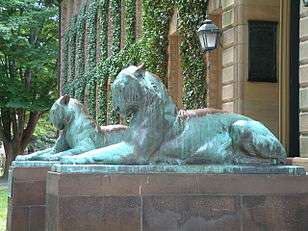Princeton Institute for International and Regional Studies
The Princeton Institute for International and Regional Studies (PIIRS) is the main research center for international studies and area studies at Princeton University and is one of the oldest centers of its kind in the United States.[1] The Institute focuses on an interdisciplinary approach and its associated faculty is drawn from more than 150 professors and other scholars from more than 25 different departments within Princeton.[1] Its director is historian Stephen Kotkin, the John P. Birkelund ’52 Professor in History and International Affairs.[2]
 | |
| Type | Private |
|---|---|
| Established | 1951; reorganized in 2003 |
Parent institution | Princeton University |
| Director | Stephen Kotkin |
| Location | , , United States |
| Website | piirs |
History
In December 2001, a group of faculty members and administrators began discussions on how to re-evaluate the various international studies programs at the university. The committee recommended the formation of an institute, which was approved by May 19, 2002.[3] The Institute was formed in 2003 as the result of a merger between the Center of International Studies, a research center that had existed since 1951, and the Council on Regional Studies, which had been an interdepartmental organization of regional study programs.[4] University President Shirley M. Tilghman said that, "This new institute will build on two long-established areas of strength at Princeton to bring an even greater global perspective to teaching and research at this University".[4] The Institute focuses on collaborative, interdisciplinary research, as well as issues of global importance. In the first academic year of 2003-04, approximately 150 graduate students were awarded grants to assist them with their research and dissertations.[5] The first director of the new Institute was Latin American studies scholar Miguel A. Centeno.[4] Today, the Institute maintains close ties with the Woodrow Wilson School of Public and International Affairs and a number of university departments.[6]
Programs
Research Centers
- The Institute is home to a number of centers, programs, and initiatives, including:
- Center for Iran and Persian Gulf Studies
- China and the World Program
- Cuba Research Network
- European Union Program at Princeton
- Fund for Irish Studies
- Institute for the Transregional Study of the Contemporary Middle East, North Africa and Central Asia
- Paul and Marcia Wythes Center on Contemporary China
- Princeton African Humanities Colloquium
- Seeger Center for Hellenic Studies
The Institute also has a number of regional programs that allows undergraduate and graduate students to take coursework and participate in university-wide initiatives:
- Program in African Studies
- Program in Contemporary European Politics and Society
- Program in East Asian Studies
- Program in European Cultural Studies
- Program in Italian Studies
- Program in Judaic Studies
- Program in Latin American Studies
- Program in Near Eastern Studies
- Program in Russian, East European and Eurasian Studies
- Program in South Asian Studies
Seminars
In 2007, the Institute, in collaboration with Princeton's Office of International Programs, launched the Global Seminars program. Led by Princeton faculty, these seminars allow students to travel to one of seven locations around the world for a summer experiential-learning course. To date, more than 800 students have participated in seminars in Africa, East Asia, South Asia, Europe, the Near East, and South America. Seminars in Summer 2018 include courses in Pamplemousses, Mauritius; Athens, Greece; Beijing, China; Sonepat, Haryana, India; Kyoto, Japan; Rome, Italy; and Venice, Italy.[7]
Fellowships
Undergraduate Fellows were designed for students in their junior year who are interested in conducting summer research abroad for their senior thesis. Up to ten juniors per year are selected through a competitive application process. Successful applicants are awarded funding to meet the entirety of their travel expenses and other potential costs.[8]
The Institute also supports graduate students who require advanced language training or access to specific archives abroad for their dissertation. The Mr. and Mrs. Yan Huo *94*95 Graduate Fellowship awards up to two fellowships per year for advanced graduate students. Summer funding is also available for intensive language study and pre-dissertation fieldwork.[9]
The Fung Global Fellowship is a prestigious, research-oriented program for early-career faculty who are interested in coming to Princeton for an academic year. The program is funded by a $10 million gift from Princeton alumnus William Fung with the aim of engage scholars around the world.[10] Scholars are eligible must hold a Ph.D. or equivalent in a relevant research field and must hold a research position outside the United States.[11]
World Politics
The Institute sponsors the World Politics journal.[12]
References
- "About PIIRS". Princeton University. Retrieved September 28, 2014.
- "Program Directors". Princeton Institute for International and Regional Studies.
- "Princeton creates international institute for research and teaching". Princeton University.
- "Princeton creates international institute for research and teaching" (Press release). Princeton University. June 30, 2003.
- "Thinking Globally: Princeton Institute for International and Regional Studies". Princeton University.
- "Q&A with PIIRS Director Miguel Centeno". Woodrow Wilson School of Public and International Affairs.
- "Global Seminars". Princeton Institute for International and Regional Studies.
- "Undergraduate Fellowships". Princeton Institute for International and Regional Studies.
- "Graduate Support". Princeton Institute for International and Regional Studies.
- "Fung Global Fellows to focus on 'Interdependence'". Princeton University.
- "Fung Global Fellows Program". Princeton Institute for International and Regional Studies.
- "World Politics Quarterly Journal". Princeton University. Archived from the original on February 25, 2014. Retrieved February 10, 2014.
External links
